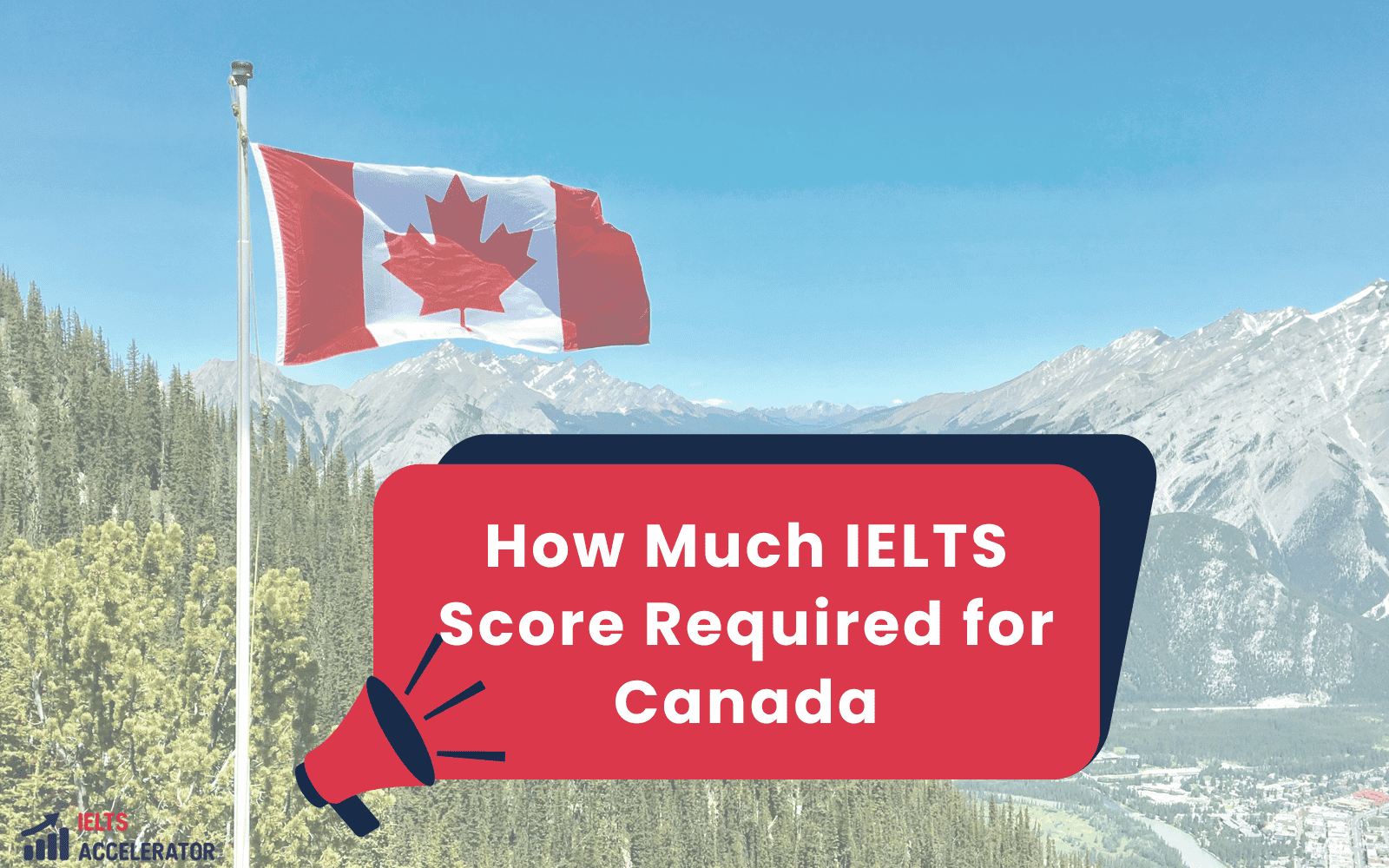Wondering what IELTS score you need to live, work, or study in Canada? You’re not alone!
Like a lot of our students we work with, you will have already shortlisted the top 3 or 4 countries that you think are going to be the best choices for your future, brand new life, with Canada one of the most popular destinations that people consider emigrating to.
And there are lots of reasons for it (apart from it’s notoriously cold weather – but don’t worry there is always a heater at hand!). In this short but fact-packed guide, we’ll break down everything you need to know about the Minimum IELTS score for Canada. Let’s dive in!
The Minimum IELTS score required for Canada immigration
When it comes to emigrating to Canada, the first thing you need to understand is that it is a points based system with two sets of points being used: one to determine which candidates can submit an application and the second post submission to decide which applications are successful.
Canada’s Points-Based Immigration System
The first points system concerns the ability of the applicant to apply to a particular route. To qualify, an applicant must first score at least 67 points out of 100. The score is calculated based on factors such as age, education, work experience, language skills, and whether or not an applicant has relatives in Canada.
After a successful application an applicant will then be ranked according to a second set of points called the Comprehensive Ranking System (CRS) which assigns points for aspects of the application similar to the first point system such as language proficiency, education, work experience, as well as a range of others. This point system is then used in conjunction with a ‘cut off score’ (set monthly by the Canadian government) to determine which candidates fall above the cut off and therefore are accepted.
The Importance of IELTS Score for Improving Your Immigration Points
One of the most important requirements is achieving the required score in the IELTS test – the ‘International English Language Testing System’. The reason it is so important is because for many of the aspects of the application assessed in the first points system there is often very little ability to improve your score, for example points are awarded for age – unfortunately there isn’t much we can do about that! However, what you can improve is your language skills and that is why IELTS offers one of the best opportunities to improve your points score.
Understanding the IELTS Test and Scoring
In case you’re new to IELTS, the IELTS exam consists of four sections: listening, reading, writing, and speaking. Each section is scored on a scale from 0-9, with 9.0 being the highest score and 0 being the lowest. In order to be considered for immigration to Canada, applicants must achieve a minimum overall score of 6.0 across all four sections. However, depending on the type of visa or program you are applying for this will vary and higher scores are typically needed. You will also have to decide whether it is best for you to take the General or the Academic exam.
Minimum IELTS Score Variations by Immigration Program
For example, if you are applying to the Federal Skilled Worker Program or the Canadian Experience Class, you will need a minimum overall score of 7.0 with no individual band score below 6.0. On the other hand, if you are applying for admission into a Canadian university or college as an international student, you will likely need a higher overall score of at least 6.5 with no band scores lower than 6.0.
IELTS Score needed for Canada : Variations by Visa, Program, and Province
The minimum scores required vary across a number of different areas including the type of visa you are applying for, the entry program, and the university you are applying to as well as your occupation or field of study.
For instance, certain professions such as doctors and nurses may require higher scores due to the technical nature of their work – read the section below if you are a doctor or nurse working or studying to work in the medical profession. In addition to meeting these overall minimum scores, some programs may also have specific requirements for each individual section of the IELTS exam. Remember to double check, your application may well depend on it!
There are provincial variations in the minimum IELTS score requirements for Canada’s Express Entry system, particularly when applying through a Provincial Nominee Program (PNP) – each province or territory may have different minimum IELTS score requirements, and they often prioritise candidates with specific language skills based on their local needs.
What is important here is that you make sure you have researched and understood the minimum IELTS scores needed for your specific immigration program or university course before beginning the application process – failure to meet these requirements will, in the vast majority of cases, result in a rejection of your application.
IELTS Minimum Score for Canada Study

Studying in Canada is a popular option for people looking to immigrate to the country. With its world-renowned educational institutions, diverse culture, and welcoming environment, Canada has become one of the top destinations for international students. But what about the IELTS band requirements for studying in Canada?
Almost all Canadian universities and colleges require international students to submit an English language proficiency test score as part of their admissions process with the most commonly accepted test being the IELTS exam.
In terms of the minimum IELTS band requirement, this varies depending on the institution and program you are applying to but in general, undergraduate programs have lower band requirements compared to graduate programs. For example, some undergraduate programs may only require a minimum overall band score of 6.0 while graduate programs may require a minimum overall score of 7.0 or higher.
Different study programs may have specific band requirements for each section of the IELTS exam. For instance, some courses may require a higher score in the writing section while others may focus more on the speaking section so again you need to do your research to make sure that you know the exact band scores you need for the institutions you are applying to.
IELTS tests can be expensive and so it is essential that you give yourself the best chances of success, this means getting hold of resources, and making sure you practise enough. There are plenty of resources all over the internet that can be beneficial but in all honesty most students need to invest in a course, the reasons for this are many and you can check out our best selling super value IELTS courses.
When you make your application to study in Canada, you will need to also apply for a study permit. To obtain a study permit from Immigration Refugees and Citizenship Canada (IRCC), you must also meet certain language proficiency requirements and so you will need your IELTS results for this as well.
One thing that students often misunderstand is that while meeting the minimum IELTS band requirements is crucial, it does not guarantee admission into a Canadian institution. Admissions decisions are based on various factors, including academic performance, relevant experience, and personal statements, but without attaining the required IELTS scores, or having proof of English language level, your application will be rejected.
I want to apply for Permanent Residency (PR), ielts score for canada pr ?
If you are considering immigrating to Canada for good and want to apply for permanent residency (PR), guess what? You will need to take the IELTS exam!
There are different categories under which you can apply for PR in Canada, such as economic class, family sponsorship, and refugee protection. Each category may have its own specific language proficiency requirements, but for most applicants looking to immigrate through economic class programs like Express Entry or Provincial Nominee Programs (PNP), the minimum required IELTS score is an overall band score of 6.0.
However, Canadian immigration uses a points based system to work out if an applicant can apply for the various programs which lead to permanent residence. This initial score is measured out of 100 and a candidate needs to reach a minimum of 67 in order to apply. Many applicants struggle to meet the 67 point cut off and so it becomes crucial to get the maximum points for english language proficiency and in order to do this you needs to aim for the scores below:
| Listening | Reading | Speaking | Writing |
| 8.0 | 7.0 | 7.0 | 7.0 |
Now let’s take a closer look at each component of the IELTS exam – Listening, Reading, Writing, and Speaking – and what minimum scores are needed for PR eligibility. For all categories except Quebec Skilled Worker Program (QSWP) applicants who have French as their first language or who have obtained a degree from an educational institution where instruction was conducted primarily in French – an individual must achieve a band score of at least 6.0 in each component.
It’s also worth mentioning that even if you meet the minimum required overall band score of 6.0, you may still be eligible for certain economic class programs such as the Federal Skilled Worker Program or Canadian Experience Class if you score higher in individual components. For example, a candidate with an overall band score of 6.0 and a minimum of 7.0 for any of the other components would have a better chance of being selected for Express Entry compared to someone who has just achieved the minimum requirement of 6.0 across all skills. Investing in your IELTS skills maximises your chances of a successful application – you can do it with our popular courses.
While there is no fixed IELTS score for PR eligibility in Canada, it’s essential to aim for an overall band score of 6.0 and a minimum of 6.0 in each component to even consider making an application.. However, scoring higher than the required minimum as shown in the table above will allow you to increase your points score and therefore increase the chances of you being able to apply.
Canada IELTS Score for Doctors, Nurses & Medical Professionals

For medical professionals looking to immigrate to Canada, the International English Language Testing System (IELTS) is an essential component of the immigration process. As we already know the IELTS test measures a candidate’s ability to use and understand the English language in an academic or professional setting, and so it has become a crucial requirement for those wishing to pursue a career in the medical field in Canada.
To start with, in general the same minimum requirements to be eligible for immigration under most skilled worker programs in Canada apply: candidates must achieve at least an overall band score of 6.0 on each individual component of the IELTS exam – Listening, Reading, Writing, and Speaking in order for an application to be considered.
However, when we look at the requirements based on the specific field (and province) then you will see that the IELTS scores for immigration into Canada for medical professionals are in fact higher than the general minimum. The table below is a general guide to the IELTS requirements for a few of the most popular jobs in the medical profession.
| Job | Overall Score Required | Extra conditions |
| Doctor | 6.5 | No less than 6.0 in each section |
| Nurse | 6.5 | Min. 7 in Speaking, no less than 6 in all other sections |
| Dentist | 6.5 | Min. 7 in Speaking, no less than 6 in all other sections |
| Pharmacist | 6.0 | No less than 6.0 in each section |
These requirements do change over time and some provinces may have higher or lower IELTS score requirements, such as Alberta which requires no less than 7.0 in each section, so you must check with the relevant provincial or territorial regulatory body for the most up-to-date information especially if you are applying for the PNP (Provincial Nominee Program).
The minimum overall IELTS score required for Canada PR through Express Entry is 6.0. This translates to a Canadian Language Benchmark (CLB) of 7, where each section of the IELTS exam (listening, reading, writing, and speaking) is scored at least 6.0.
A 7.5 in IELTS is a strong score for Canada immigration and would give you a significant advantage in the Express Entry pool.
5.5 is not sufficient to meet the minimum requirements for most immigration programs in Canada.





